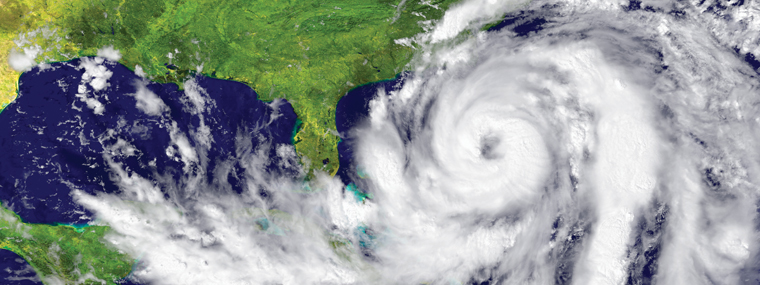
Prepare Your Roof for a Hurricane Before You’re in the Forecast Cone
By Casey Crowther / Published July 2019

A hurricane is coming. We don’t know when, and we don’t know where, but it’s coming. A look at historical hurricane tracking data over the past 100 years shows so many lines plotted on the map that you literally cannot see Florida.
So, if we know a hurricane is coming, why is there always a mad dash to prepare? It might be a cliché, but the time to prepare is now before your hometown falls into the cone of uncertainty and before the tone in your trusted meteorologist’s voice begins to change.
News reporters talk about storm prep as if it’s something done two or three days in advance: things like stocking up on food and water, gathering emergency supplies, gassing up the car, and boarding up the windows. Rarely is a roof part of that conversation, and there’s a reason why—it’s too late at that point.
Here’s why you should begin storm preparations for your roof today—a roof damaged during a tropical storm or hurricane doesn’t just mean you’ll need to repair or replace your roof after the storm. It could mean you’ll need to replace everything inside, from the drywall and light fixtures to the flooring and inventory. For retail or appliance stores, this could mean replacing merchandise worth tens of thousands, perhaps millions, of dollars if they’re damaged by water, wind, flying debris, or falling objects.
Below are five steps to take that will help prepare roofs on commercial properties for hurricane season:
- Roof inspection: Property owners should have their roofs inspected annually. An experienced inspector will look for cracks or chips in tiles, displaced or buckled shingles, missing nails and screws, pooled water, drainage issues, mold or algae growth, damaged flashing, rust, and more. They will not only spot issues before they become a problem but will also make recommendations that help extend the life of a roof. Documenting that a roof is in good shape prior to a storm is critical when filing a post-hurricane insurance claim.
- Insurance policy review: Check your property insurance policies to make sure you’re fully covered for damage caused by tropical storms and hurricanes. Your policy should cover the full replacement cost for the entire structure, as well as all contents, equipment, technology, and inventory. Hurricane insurance often excludes damages caused by flooding or storm surge, which can require a separate policy through the National Flood Insurance Program. Make sure your policies are in place before a storm forms because some policies require a waiting period to take effect or prohibit companies from issuing policies once a named storm is in the Atlantic Ocean or Gulf of Mexico.
- Photo documentation: An experienced roofing inspector will provide photos of your roof, both with a traditional camera and a drone. Documentation is critical should the need arise to file an insurance claim after a storm. Before paying a claim, insurance companies want to see proof that a storm indeed caused damage to the roof and it wasn’t a pre-existing problem.
- Cleanup: If a heavy rain event or tropical system is on the way, hire a professional to check gutters and downspouts for debris. Fallen leaves, twigs, pinecones, and even chips from broken tiles or granules from asphalt shingles can accumulate and impede drainage. Overweight, clogged gutters can begin to sag or pull away from the roof, and pooled-up water can foster rotting and mold growth, particularly on flat roofs. Also, secure any loose items, including sidewalk displays, pool furniture, and potted plants.
- Landscaping: Imagine hurricane-force winds blowing from the north, south, east, and west. If a tree or utility pole is within close proximity, that is a potential falling object that can damage a roof. Tree branches should never extend over a structure.
Casey Crowther
President, Target Roofing & Sheet Metal
Casey Crowther is president of Target Roofing & Sheet Metal, a licensed and insured commercial roofing specialist that provides new roofs, reroofs, repairs, and maintenance plans. The company is headquartered in Fort Myers and serves Florida’s Gulf Coast. For more information, please visit TargetRoofers.com, call (239) 334-7496, or email admin@targetroofers.com.




